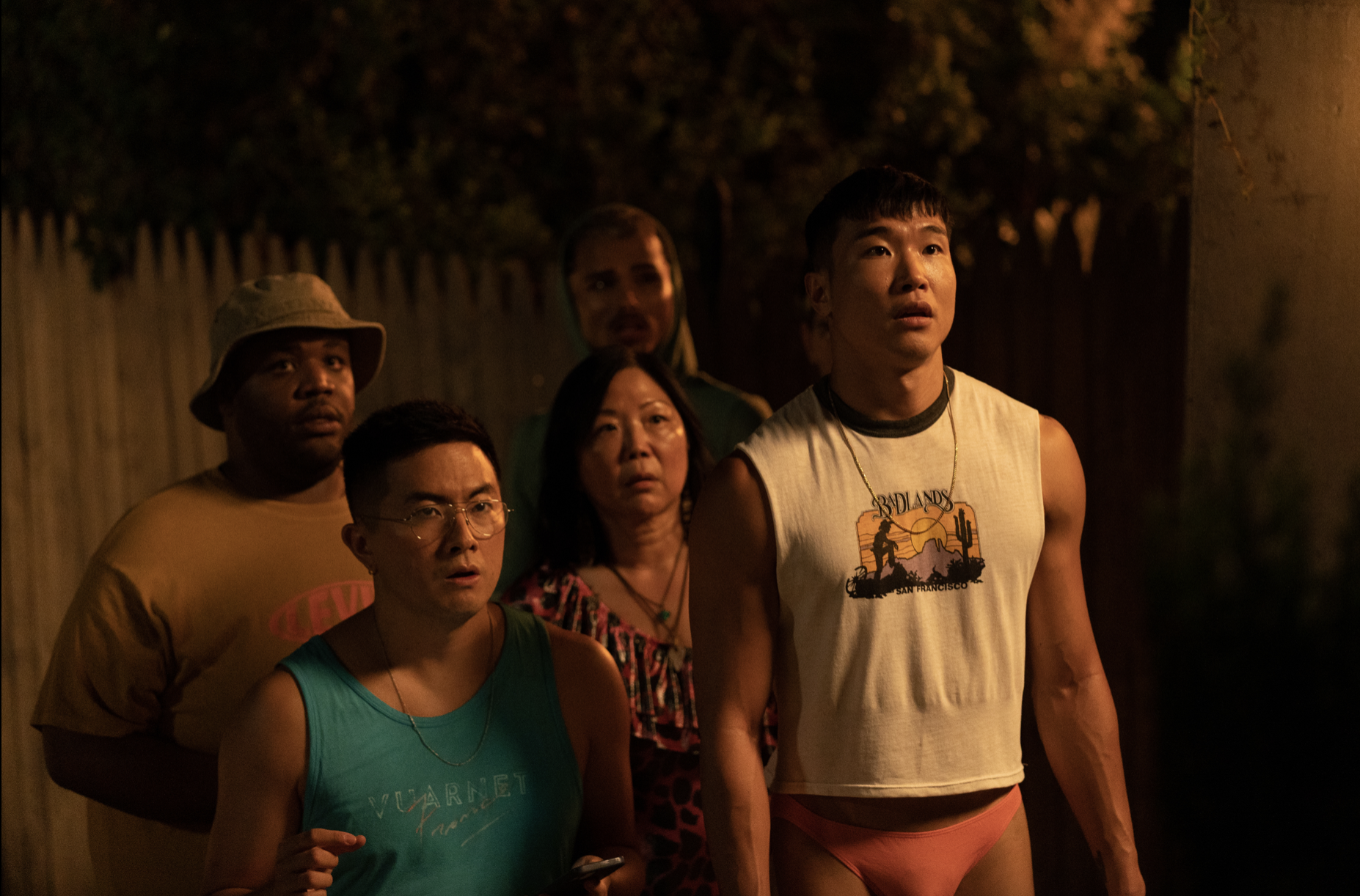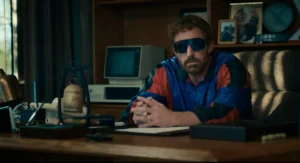“It is a truth universally acknowledged, that a single man in possession of a good fortune, must be in want of a wife.” So begins Jane Austen’s seminal 1813 romance novel Pride and Prejudice, and so also begins the 2022 film Fire Island. Writer and star Joel Kim Booster, along with director Andrew Ahn, imbue this homage to Austen with a little more pride and a little less prejudice. Rejecting the author’s heteronormativity, Fire Island centers the titular vacation spot known for its celebration of gay life. As Noah (Booster) explains in his opening narration, the island has been a bastion of gay liberation for decades; but no one would expect it to be a perfect setting for a modern comedy. Fire Island would likely be a humorous and sweet romantic comedy without the Victorian trappings, but the most surprising thing about the film is how closely it mirrors a genteel romance novel, even with the explicit sexual humor.
In Fire Island, Noah goes on vacation with friends Howie (Bowen Yang), Luke (Matt Rogers), Keegan (Tomas Matos), and Max (Torian Miller). Upon arrival, they quickly meet Charlie (James Scully), who is much richer than them and with a possible crush on Howie, and his wealthy housemates, Cooper (Nick Adams) and Will (Conrad Ricamora). There’s also Dex (Zane Phillips), an attractive man who catches Noah’s eye, and they’re all watched over by Erin (Margaret Cho), their lesbian friend and de facto mother who owns the beach house they stay at. Booster quickly introduces a lot of characters in his script, but puts them under the umbrella of what appears to be the main plot: Noah’s desire to be wingman to soft-spoken Howie. Howie’s newfound existential crisis (he’s turning 30 and has never had a boyfriend) grounds Noah’s attempt to find him a partner, or at least a hookup, through most of the first act. Booster and Yang create a dynamic best-friend rapport, and this section of the film is where the jokes fly sharpest and hardest. Contemporary gay culture is referenced and dissected through the five friends’ rapid back-and-forth conversations and their interactions with the men next door. No one is unafraid to engage with physical comedy or commit to a ridiculous joke, and the material is elevated by the ensemble’s command of performance.
Juggling all of the characters doesn’t always work out (Luke, Keegan, and Max end up mostly serving as window dressing), but the main theme of the script expertly shifts from Howie’s romantic escapades to the class divide on Fire Island. Noah’s narration makes it clear that there are some places on the island that the gang won’t be recognized due to their social status, and even more microaggressions ensue since, besides Luke, they are not white. When they go to Charlie’s house for a party, some of the men are quietly incredulous at their arrival, unable to comprehend a gay scene where people are not flaunting their wealth. The film’s funniest and possibly best scene is at “Underwear Night,” an island-wide party with only a $20 cover charge; anyone can be anyone at Underwear Night, and the vulnerability of being unclothed (and a healthy supply of drugs) allows secrets to be spilled. It’s a perfectly updated Austen scene, in which characters express their true desires and bridge societal divides, and it’s aided by Ahn’s direction, which utilizes framing and compositional choices to highlight these divides and visually express moments where characters are brought together.
The script quickly moves on from slobs-vs-snobs comedy to strike a poignancy in this divide; Erin is broke herself—she was “an early investor in Quibi,”—and the beach house has to be sold, threatening to make this potentially the men’s last trip to the island together. Noah and Howie are trapped in that feeling you get on vacation, where you’re having such a good time and subconsciously dreading the day it will end, and while Erin tries to get them to live in the moment, they are sharply aware that they can’t party as hard as their new companions. (Cho is hilarious as a much younger version of the classic fussy-yet-motherly mentor.) The class divide issues so eloquently set up in the opening sequence eventually fade away instead of blossoming into further conflict, but they serve a crucial purpose in animating the film.
In the latter part of Fire Island, it becomes more clear who will pair up with whom, and the film’s characters begin to more closely resemble the characters in the novel. For those with hazy memories of the book, the pairings arrive naturally and spontaneously, and while they shouldn’t be spoiled, the second half allows Will, and his actor Ricamora, to flourish. Will, an uptight, straitlaced, and very wealthy lawyer, acts as a welcome restraint on the island shenanigans, but Ricamora ends up being the best part of the film as he unlocks his emotional side. As the movie rushes to neatly tie its plots together, they become united through Ricamora, who effortlessly nails punchlines as he progresses.
While Fire Island isn’t afraid to discuss gay male sexuality, it can sometimes shy away from going all the way with its humor. This produces mixed results: it’s far more explicit than Austen could dream to be, and it doesn’t make sex feel like a source of shame the way so many modern comedies do. However, the film plays it safe when it comes to conflict resolution, tying complex issues into a neat little bow at the end. The result is a somewhat generic happy ending, but given the film’s emotional range, a more bittersweet one may have been more fulfilling. Like other Austen adaptations and homages, Fire Island provides the frothy romance and sparkling wit that one might remember from an Austen book without unpacking its characters’ complexity the way she would. Nevertheless, it’s still an excellently performed and sharply written film, and I’ll be first in line when Booster and Ahn release Gay-ne Eyre. I was always more of a Brontë fan anyway.







